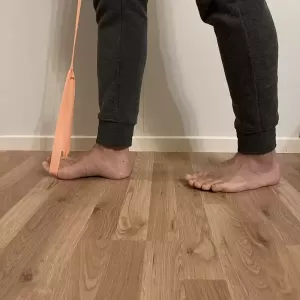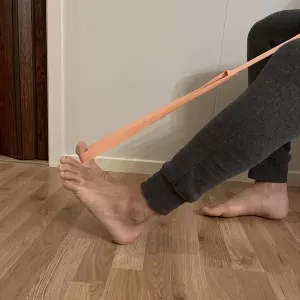Abductor Hallucis Stretches For Flexibility And Posture of Your Foot
The abductor hallucis muscle is a key player in the movement and support of your big toe. Located along the medial part of your foot, this muscle helps you flex and move your big toe away from the midline of your body (a movement known as abduction).
In addition to its role in big toe movement, the abductor hallucis also helps to support the medial arch of your foot.
Stretching this muscle can benefit both the function of your big toe and the overall posture of your foot.
Stretches For Abductor Hallucis Muscle
To stretch the abductor hallucis muscle, you’ll want to perform movements that are opposite to its typical actions, such as extension and adduction. Here are a few ways you can stretch this muscle:
Standing Big Toe Extension with Strap
Stand with one leg slightly bent and in front of the other leg. Keep the back leg straight. Take a strap and loop it around the ball of the front foot. Slowly pull on the strap, feeling the stretch in the back side of your big toe and foot.
Hold this stretch for 30 seconds to help increase flexibility in abductor hallucis.
Seated Big Toe Extension with Strap
All you need for performing this stretch is a chair and a little bit of space. Start by sitting in the chair with your feet flat on the ground and your knees bent.
Then, lift one leg off the ground and extend it in front of you, keeping the heel on the ground and the toes pointed upwards.
Reach down towards the toes of the extended leg and place the stretching strap around the ball of your foot. Gently pull the big toe of the foot towards you.
Hold the stretch for 30 seconds, then release and repeat on the other side.
Seated Big Toe Adduction
Stretch abductor hallucis from seated position:
1. Start by crossing and bending one of your legs at the knee.
2. Reach your big toe with your fingers
3. Gently push the big toe towards your other fingers without bending or extending it.
4. Hold this stretch for 30 seconds when you feel a pleasant stretching sensation in the muscles.
How to Find Abductor Hallucis Muscle
You can palpate (or feel) the abductor hallucis muscle by sitting with your knees bent. Focus on your foot and try to lift your big toe away from the other toes, as if you are trying to separate it from the rest of your foot.
This movement is called abduction.
You should feel a muscle contracting on the top of your foot, near the base of your big toe.
This muscle is the abductor hallucis, and you can feel it working by gently pressing on different areas of your foot and identifying which areas produce a contracting sensation when you move your big toe.
Creating your full body stretching routine doesn’t have to be hard. Here are some tools that can help you create your stretching routine fast.


